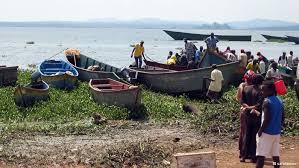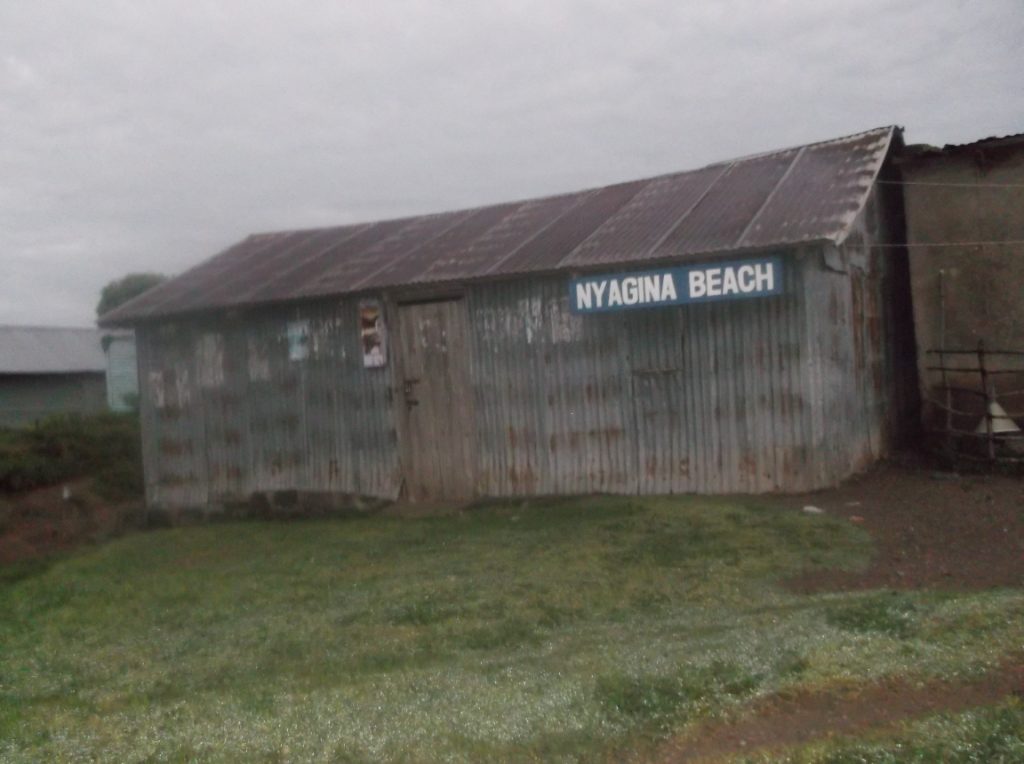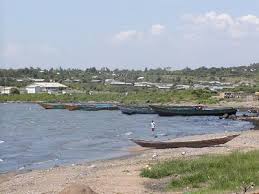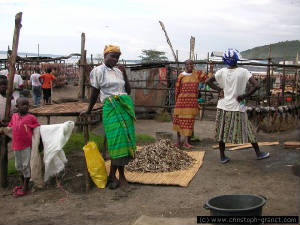By James Adika
A cool breeze is blowing from the lake on a Sunday afternoon . Wafting on the breeze is a smell that is mildly acrid and fishy, a smell that defines the beaches of Lake Victoria. Here fish selling business booms,Men who are the gods of fishing, women both old and young are busy either packaging, slicing fish or doing best bargains for the day.
Apart from the noisy and busy scenes of fish business , one cannot miss to see the poorly constructed rental houses of which one of them comes barroom sounds and a drunken young man singing the song, “I’m not sober Odiero…” staggers by. ”Anyisi …Isero chi jaramba. Isero chi jaramba, anyisi“.
The song gets dirty after this but simply put, he is telling some other young man that he is seducing the wife of the man from Ramba.
This is Nyagina beach at Rusinga Island, a template of how many Lake Victoria beaches look like. On the part of the beach are women busy spreading sardines or commonly known as omena (dagaa) on fish nets to dry. Two of them stand out. They have short hair that is dyed pink and yellow, oily faces and everything is either in the wrong form or place.
They sit next to each other, applying make-up poorly. They represent the meeting point between fish and prostitution. They are the story of “fish-tuition“.

The fish business consists of the boat owners, fishermen and the ‘middle woman’ popular known as “jaboya”. If you need any assistance in this business, you must approach this people in that order.
On most beaches the women are attached to one boat or different boats owned by the same man. Due to manual nature of the fishing business, fish price depends on the whims and moods of the fishermen.
When they have decided the price, it is the ‘middle women’ who take over the selling and distribution. Getting to become a jaboya for a boat is the fulcrum on which fish-tuition revolves.
Being a middle woman for any boat is a position that comes with many goodies including a daily assurance of fish to sell, a chance to wield power of the beach and money if you are good at bargaining.
More often than not, this position is secured in exchange for sex. The fishermen decides who get the port and more cares, the person is young ,pretty, recently widowed or has a drunkard for a husband.
Amina Aketch is one such of a woman. “I have two children and iam widowed. I come to his beach every day early in the morning and will be off by 11am. All I does is to wait for a specific boat, get the day’s catch, sell some, carry home a little for lunch and then wait for a knock at the door of my rented house in the evening by the leader of the boat. We usually have sex and then he goes off for night fishing. This is the way I have kept my job for the last six years.I know it might be risky for me but I need to earn a living and take care of my children,I have no choice but to give in to this kind of cruel business venture.”She sighs.

A similar tale can hardly be forgotten about six young men got off a motorboat at Remba Island from the mainland sometimes back, all they had in mind was to fish for three months, sell some of their catch and bring the remainder back to the mainland once the three months was done.
That was their plan, at least. They did not know that on the island was a group of old women who preyed on young men from far off places.These women are so well organized that when young men step off the boat, they all agree who goes for whom so that two of them never go after the same man.
Mostly widowed, they are what might be called the queens of the island; they have money and can take care of the poor young men. And as a young man walks around the beach, he soon realizes that there is a certain woman who is friendly and accommodating. Before he knows what is happening, he will be taking meals at her house, and then she will put the young man in charge of her fish store and her money.
His loyalty bought, she is ready for the kill. She seduces the young man and before long he is confused and operating like a Zombie.
Many such young men end up forgetting their homes or if they ever go back, they will be destroyed and ill.Kennedy Yogo alias “Nyakonda Modho” of Waregi Village of Rusinga Island fell victim to one such woman. They went fishing in Remba Island in what fishermen call “mapara” and were to fish for three months and then go back to the mainland.
He knew of the existence of such women but swears that what happened to him is beyond his comprehension. They stayed for three weeks and on the forth, he was living with certain woman.”I only remember that she was good to me, and knew what I wanted even before I asked. Soon she put her shop in my care and I don’t remember the rest”, says the teary, thin, red-lipped and tired dark young man.
They say he could be infected with HIV, what they call “jakom“, something that has visibly scared him, and the tell tale signs of the infection can be seen in his broken frame, sunken eyes, red lips and bony structure not to mention the aches in all parts o f the body and a close association with all kinds of infections, his family is cursing the island and beach queens.
Similarly, Jackline Odemba, a fish monger who transports fish to Nairobi, says they are sometimes forced to give in to sex in order to get fish.“For one to maintain the high demand for fish, we must create ‘concrete’ relationship with the fishermen which automatically leads to sex.”
Such cases have seen Homa Bay be on the spot with reports showing highest number of HIV cases. The county has a prevalence rate of 27.1 per cent with 127,140 adults and 22,851 children living with the virus, according to Kenya Aids Indicator Survey 2015.
According to District Aids and STIs Coordinator (DASCO) Joseph Onyango, “ HIV/Aids prevalence rate in Mbita Sub-County currently stands at 27 per cent against country’s seven per cent. He says care-free lifestyle and ‘floating’ money are major causes of rising cases of HIV/Aids infections in the area. Fishermen engage in unsafe sex without considering dangers they are putting themselves in.” Onyango notes with concern.He says with their tight schedules, very few get t time to go for VCT(Voluntary Counseling and Testing ) and even those who have already tested positive never return for the drugs.
Onyango says with introduction of a drop-in centre, the second one in the Sub-County, they expect more fishermen to get access to various services. “ Services will always be readily available to fishermen and their families they will be accessing any time.”
Mbita Health Ministry’s Cecilia Ayieko says they have already attached two trained nurses to the centre. She says depending on number of clients, they will consider increasing the number of nurses.Ayieko adds that “fish for sex” trade is fueling new infections in the region. “Due to the high demand for fish within Homa Bay County and due to water hyacinth which has covered parts of lake Victoria, some fishmongers are forced to exchange fish for sex sadly very few use protection.”
In Mbita Sub County for instance, most girls have ended up in fish-trading business, abandoning school. Mr. Onyango blames it on a bad culture that sidelines women and girls. “Girls here are viewed as family women and schooling is considered a waste of resources.” says Onyango. With the high prevalence of HIV and Aids in the sub-county, he is worried that many girls might not achieve much academically if nothing is done.
“Sadly, even teachers view girls as wives, this leaves Mbita sub-county with the dubious reputation of having the highest HIV and Aids prevalence in Nyanza Province. This has resulted in many orphans and widows, attracting the sympathy of well wishers. As a result there is a high number of NGOs in the area,” says Mbita Deputy County Commissioner, Mr. Obel Ojwang’
County government of Homabay is already taking steps to reverse this trend. Governor Cyprian Awiti is currently engaged in a campaign encouraging people to know their status for early management of the disease.”HIV in Homa Bay has become the talk of the day and I have declared it a disaster affecting us. We are making concerted efforts with development partners to help us fight the scourge,” said Awiti.
The governor said there was need for a special fund in the county for fighting HIV. He said 4 million ksh available for the health docket in the current financial year is inadequate for the fight against the scourge. “We are going to present a special budget to the county assembly for fighting the scourge; hence I am appealing to our assembly members to be cooperative so that we can reduce the spread of the virus.”

In an interview with Talk Africa, the county executive in-charge of Health, Dr. Lawrence Oteng, said youth who are sexually active were the most affected.“Many of our youth form the bulk of those getting new infections and which we must control,” Daid Dr. Oteng. He noted that if the youth could abstain from irresponsible sexual behavior, then the county’s HIV infection rate would drastically reduce.
Dr.Oteng also revealed that another target group was pregnant women since only 50 per cent had been placed under the program to prevent transmission to the child. He also complained of lack of support from religious leaders.















